| Listing 1 - 5 of 5 |
Sort by
|
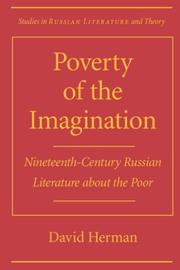
ISBN: 0810116928 0810121301 Year: 2001 Publisher: Evanston, Illinois : Northwestern University Press,
Abstract | Keywords | Export | Availability | Bookmark
 Loading...
Loading...Choose an application
- Reference Manager
- EndNote
- RefWorks (Direct export to RefWorks)
The primal scene of all nineteenth-century Western thought might well be the moment an observer gazed at someone poor, most commonly on the streets of a great metropolis, and wondered what the spectacle meant in human, moral, political, and metaphysical terms. In Russia, where so much of the population was impoverished, the moment held special significance. David Herman examines how Russian writers portrayed this poverty and what their portrayal reveals and articulates about core values of Russian culture.Focussing on specific texts but addressing the literary tradition as a whole, Herman begins with Karamzin's immensely popular story "Poor Liza", the first in a sequence of poverty narratives that self-consciously address one another. He then considers Pushkin's "Egyptian Nights"; Gogol's "Overcoat", Petersburg tales, and Selected Passages; and Dostoevsky's Idiot and 1880 "Pushkin speech".With a series of innovative readings, Poverty of the Imagination teases out a Russian discourse on lack which owes its peculiar richness to an insistence on solving simultaneously problems of social justice, national identity, and the ethics of the human imagination. As prominently as poverty figures in Russian literature, this is the first sustained analysis of its literary, conceptual, and cultural implications. As such, it deepens our understanding and appreciation of some of the most widely read literature of all time.
Russian literature --- Poor in literature. --- Poverty in literature. --- History and criticism.
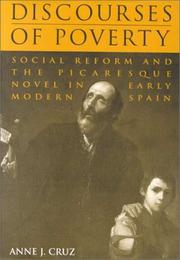
ISBN: 0802044395 9786612037061 1282037064 1442673958 9780802044396 Year: 1999 Volume: *76 Publisher: Toronto, [Ontario] ; Buffalo, [New York] ; London, [England] : University of Toronto Press,
Abstract | Keywords | Export | Availability | Bookmark
 Loading...
Loading...Choose an application
- Reference Manager
- EndNote
- RefWorks (Direct export to RefWorks)
In this ground-breaking study, Anne Cruz examines the treatment of poverty, prostitution, war, and other social concerns in the cultural and literary discourses of early modern Spain. This book investigates the polemics on poor relief through religious charity and secularized reform articulated not only in the Spanish picaresque canon - Lazarillo de Tormes, Guzm¯n de Alfarache, El busc3/4n - but also in female picaresque narratives and soldiers' tales. Emphasizing Bakhtin's notion that discursive practices must be assessed as they intersect and become textualized in history, the book also looks at this literature in relation to normative writings such as royal decrees, regulations, economic proposals, synods, and sermons. Through these discourses, authors and authorities alike debated their theories of poor assistance for both men and women, from the critique of unregulated prostitution in works such as La lozana andaluza to the control of impoverished youths through military conscription as in Alonso de Contreras and Estebanillo Gonz¯lez. The rupture of the feudal system and the economic devastation of the country precipitated a dramatic rise in the number of poor, who were increasingly perceived as delinquents by an anxious populace. The book employs Foucault's paradigms of confinement and control to study the various suggestions for the social containment of Spain's marginalized elements. Positing that the literary p¦caros and p¦caras assume the role of scapegoats for this disenfranchised social Other, Cruz further argues that the picaresque novels respond dialectically to the growing demonization of the poor in early modern Spanish culture.
Armoede in de literatuur --- Pauvreté dans la littérature --- Poverty in literature --- Picaresque literature, Spanish --- Spanish fiction --- Poor in literature --- Social problems in literature --- History and criticism --- Picaresque literature [Spanish ] --- Classical period, 1500-1700 --- Poverty in literature. --- Poor in literature. --- Social problems in literature. --- History and criticism.
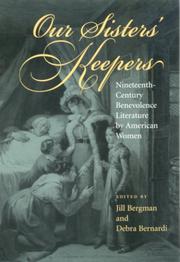
ISBN: 0817351930 9780817381660 081738166X 9780817314675 0817314679 9780817351939 0817314679 Year: 2005 Publisher: Tuscaloosa University of Alabama Press
Abstract | Keywords | Export | Availability | Bookmark
 Loading...
Loading...Choose an application
- Reference Manager
- EndNote
- RefWorks (Direct export to RefWorks)
American culture has long had a conflicted relationship with assistance to the poor. Cotton Mather and John Winthrop were staunch proponents of Christian charity as fundamental to colonial American society, while transcendentalists harbored deep skepticism towards benevolence in favor of Emersonian self-reliance and Thoreau's insistence on an ascetic life. Women in the 19th century, as these essays show, approached issues of benevolence far differently than their male counterparts, consistently promoting assistance to the impoverished, in both their acts and their writings. <
American literature --- 19th century --- History and criticism --- Literature and society --- United States --- History --- Women and literature --- Women authors --- Benevolence in literature --- Charity in literature --- Poor --- Poor in literature. --- Poverty in literature. --- Charity in literature. --- Benevolence in literature. --- English literature --- Agrarians (Group of writers) --- History and criticism.
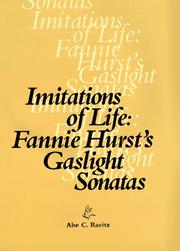
ISBN: 0585128618 9780585128610 9780809386635 0809386631 0809321424 9780809321421 0809329085 9780809329083 Year: 1997 Publisher: Carbondale : Southern Illinois University Press,
Abstract | Keywords | Export | Availability | Bookmark
 Loading...
Loading...Choose an application
- Reference Manager
- EndNote
- RefWorks (Direct export to RefWorks)
In the early 1920's, Fannie Hurst's enormous popularity made her the highest-paid writer in America. She conquered the literary scene at the same time the silent movie industry began to emerge as a tremendously profitable and popular form of entertainment. Abe C. Ravitz parallels Hurst's growing acclaim with the evolution of silent films, from which she borrowed ideas and techniques that furthered her career. Ravitz notes that Hurst was amazingly adept at anticipating what the public wanted. Sensing that the national interest was shifting from rural to urban subjects, Hurst set her
City and town life in literature. --- Hurst, Fannie, 1889-1968 -- Criticism and interpretation. --- Immigrants in literature. --- Poor in literature. --- Slums in literature. --- Women and literature -- United States -- History -- 20th century. --- Hurst, Fannie, --- Criticism and interpretation. --- Danielson, Fannie Hurst, --- Kherst, Fanni, --- Women and literature --- History
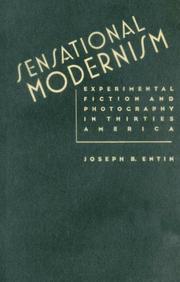
ISBN: 1469606615 9781469606613 9780807831366 0807831360 9780807858349 080785834X 9798890880581 Year: 2012 Publisher: Chapel Hill : The University of North Carolina Press,
Abstract | Keywords | Export | Availability | Bookmark
 Loading...
Loading...Choose an application
- Reference Manager
- EndNote
- RefWorks (Direct export to RefWorks)
Sensational Modernism: Experimental Fiction and Photography in Thirties America
American fiction -- 20th century -- History and criticism. --- Art and literature -- United States -- History -- 20th century. --- Documentary photography -- United States -- History -- 20th century. --- Experimental fiction, American -- History and criticism. --- Mass media and art -- United States. --- Modernism (Literature) -- United States. --- American fiction --- Poor in literature --- Experimental fiction, American --- Art and literature --- Documentary photography --- Mass media and art --- Modernism (Literature) --- Visual perception in literature --- Social problems in literature --- Poverty in literature --- English --- Languages & Literatures --- American Literature --- Crepuscolarismo --- Literary movements --- Art and mass media --- Art --- Photography, Documentary --- Photography --- American experimental fiction --- American literature --- History and criticism --- History
| Listing 1 - 5 of 5 |
Sort by
|

 Search
Search Feedback
Feedback About UniCat
About UniCat  Help
Help News
News